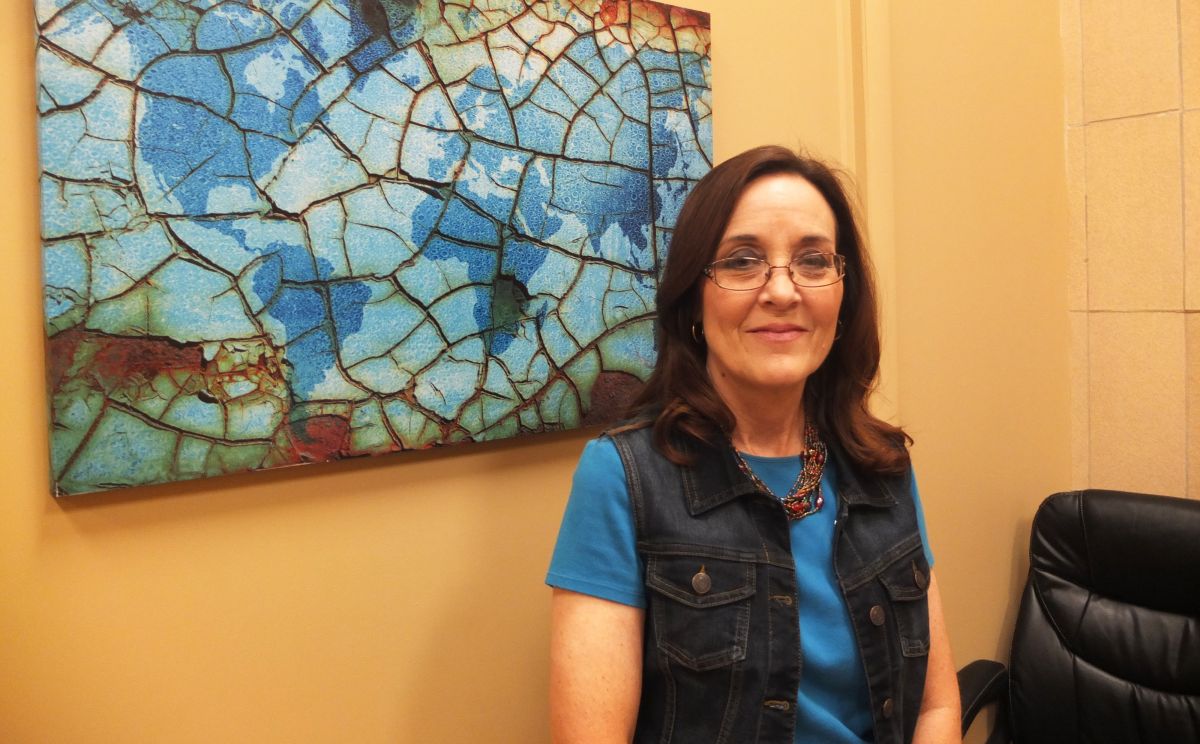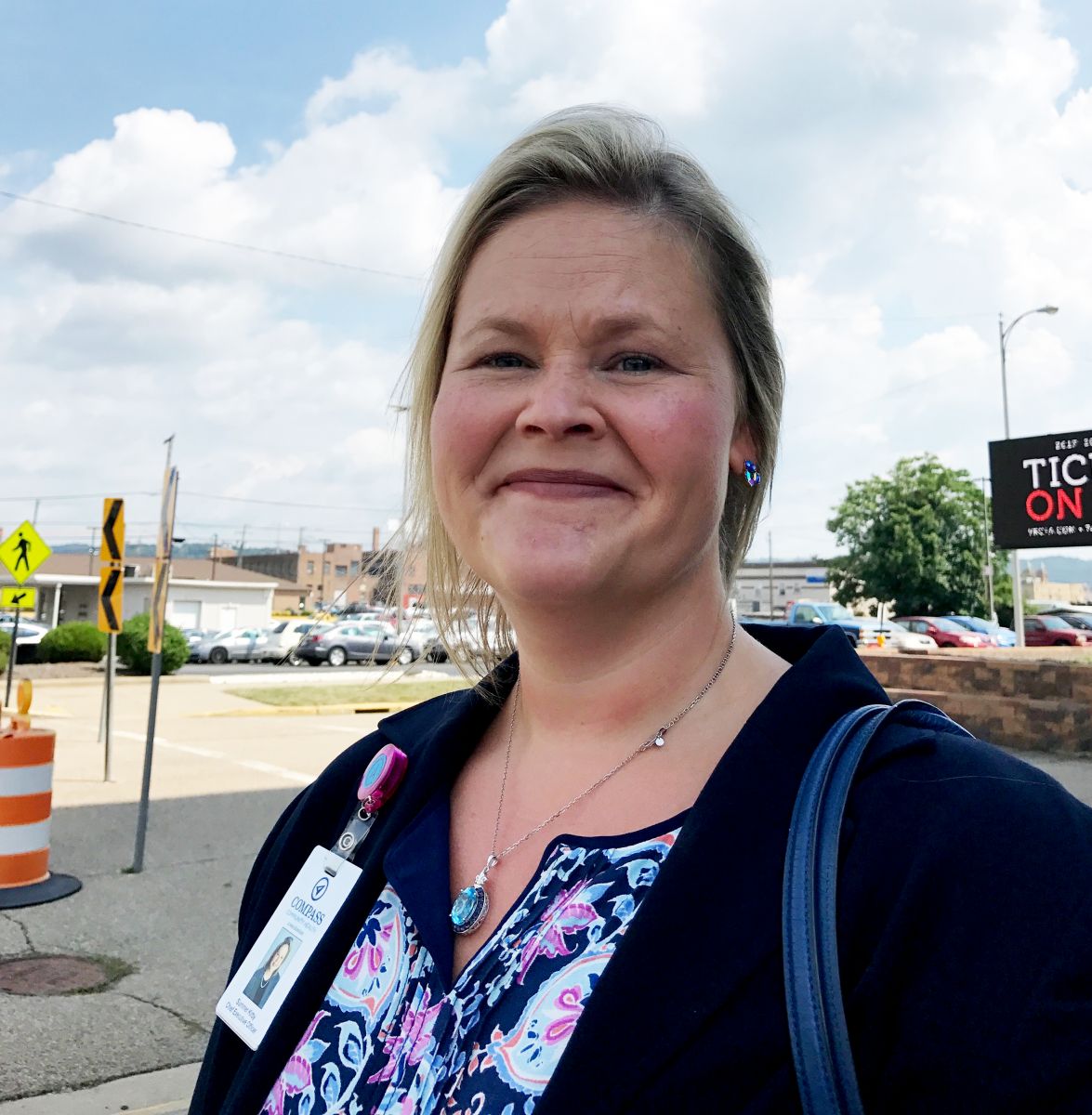
Historic Bonneyfiddle in Portsmouth, Ohio. (Photo by Jack Shuler)
Devon Applegate’s life in Scioto County, Ohio, has paralleled one of the worst drug epidemics this nation has ever seen. During his 19 years, he’s watched as opioid pills, dispensed by doctors to seemingly anyone who walked through their doors, destroyed the lives of many people in his community and throughout Ohio.
The problem grew to a scale that it is now part of a nationwide crisis, leading the Trump administration to contemplate declaring a state of emergency. Southern Ohio is one of the opioid epidemic’s epicenters, and the problem continues to grow. In 2016, 4,050 Ohioans died from unintentional drug overdoses — a thousand more than the year before.
In late August, Applegate skipped his first class of the semester to hear Vermont Sen. Bernie Sanders speak on the campus of Shawnee State University in Portsmouth, Scioto County’s largest town, sitting on the bank of the Ohio river. The independent democratic socialist and former Democratic presidential primary candidate was entering potentially unwelcome territory. In Scioto County, Trump won two-thirds of the votes in the general election.
“I am here,” Sanders said, “because I am an old-fashioned guy who really does not believe in red states and blue states. I believe that the issues raised here… are exactly the same issues that are being raised in Democratic communities all over America. And I think it is high time we focused on the most important issues facing our country and do not allow people to divide us.”

Sen. Bernie Sanders (I-VT) at Shawnee State University on Aug. 22, 2017 in Portsmouth, Ohio. (Photo by Maddie McGarvey/Getty Images)
Applegate said he was excited that someone of Sanders’ stature was coming to Portsmouth — during the last election cycle neither Trump nor Clinton came to his county. But Applegate was hoping for more than just Sen. Sanders’ presence in his community: He wanted to hear how Sanders would address the crisis facing it.
So about halfway through the event, when Sanders asked for public comment about the opioid epidemic, Applegate felt moved to speak. In front of hundreds of strangers, he told his story — how he lost his father to an overdose in 2008; how his mother still suffers from addiction. He explained that when he was younger his parents were unemployed and “had a sense of hopelessness.” His grandparents raised him and he’s now a healthy, inquisitive 19-year-old. He told me after the event that he felt nervous sharing his story in public but that if anyone has a connection to the epidemic, he does — it has shaped who he is today.
Portsmouth became widely associated with the opioid crisis after journalist Sam Quinones described the town’s struggles in his 2015 book Dreamland. He wrote how by 2010, 9.7 million doses of opiates were dispensed in Scioto County — 123 doses each for every person in the community, child and adult alike. Portsmouth fought back and, in 2011, the DEA helped it shut down the “pill mills.” But that didn’t solve the problem: Once the pill mills closed, addicted persons switched to heroin and, now, synthetic opioids.
“Nobody here has a magical solution for the problem, but I think the fundamental question we have got to ask ourselves is what is going on in our country when so many people seek solace in drugs and addiction, when many of them know that the only things that happen with dependency on opiates are death or jail?” Sanders told those who came to hear him speak. “It has a lot to do with hopelessness, with lack of community, with people feeling isolated and alone.”
When Sanders asked the audience if they knew anyone who had been affected by the epidemic, nearly every hand in the room went up. These are people who have seen a lot. Parents who’ve watched children struggle. Grandparents who have had to raise their grandchildren. And children, like Devon Applegate, who have lost parents.
A crisis decades in the making
The hopelessness that Sen. Sanders spoke of, and that Applegate saw in his parents, grew with the area’s economic decline in recent decades, driving joblessness and poverty.
Portsmouth rests on a dramatic bluff overlooking the Ohio River — the cliffs of Kentucky shoot skyward on the opposite side. This location and abundant natural resources made Portsmouth an industrial giant, manufacturing everything from steel to shoes. By the 1980s, much of that manufacturing work had disappeared — especially after Armco Steel purchased the Empire Detroit Steel Works. Rather than updating the facility, they shut it down, laying off 1,300 people.
The shocks of deindustrialization have resonated throughout the community. Portsmouth’s population peaked at 42,560 in 1930. Today there are only 20,266 residents. People have moved out of the city proper and into the suburbs, while others have moved in search of work.
In 2000 the poverty rate for Scioto County was 18.5 percent; by 2014, it had risen to 27.2 percent, though it has declined slightly in recent years. In Portsmouth proper, though, the number is even higher — 35.8 percent of people in the city are living below the poverty level, according to the most recent Census Data, up from 23.6 percent in 1999.
Jason Kester, executive director of the Southern Ohio Port Authority, told me that he would like to see more living wage jobs in Portsmouth and Scioto County. Good jobs are necessary, he said, “There’s a direct link between having a job and having hope and not getting on drugs.”
He has seen some progress. The unemployment rate for Scioto County was 9.3 percent in 1990 and grew to 13.3 percent in 2010. As of August 2017, it was 7.1 percent — a tremendous improvement, but still higher than the state and national rates.
Last year, he said, Portsmouth, Ohio, was ranked number 10 for new economic development among 100 small cities in the nation by Site Selection magazine. Kester says the story has raised the community’s profile and given the work they are doing “credibility.” Most recently, a polypropylene products manufacturer announced a new facility in Portsmouth that will bring 100 jobs.
But this progress, Kester said, is often overshadowed by the drug epidemic — and some of the press coverage that comes with it. Kester pointed to a recent story in The Guardian that referred to Portsmouth as the “pill mill of America.” If you read that story, he said, you would believe “everyone’s driving around shooting up heroin in their neck.” Kester penned a forceful response to the story in the local newspaper.
Kester told me he knows the epidemic is bad. And he should — he has worked as a volunteer firefighter and EMT for 20 years in Scioto County and has seen his share of overdoses. But he’s mindful of hyperbole. He wishes outsiders would acknowledge the efforts people are making to transform this community.
Indeed, this community has hit back hard. Last June, days after Ohio announced a lawsuit against five opioid painkiller manufacturers, Scioto County and the City of Portsmouth announced their own lawsuits against wholesale distributors. Small city is taking on Big Business.
More immediately, though, community health officials have made significant strides. At one time, Scioto County led the state in fatal overdoses, but no longer does. And, in part due to a weekly needle exchange — one of only seven in all of Ohio — there has been a 40 percent drop in new Hepatitis C cases since 2012.
Portsmouth fights back
Lisa Roberts, of the Portsmouth Health Department, explained that while much has been done, there is much work ahead. Roberts has been with the department for 30 years and has worked on the drug epidemic exclusively for eight years. She was also an important figure in Quinones’ book.

Lisa Roberts in her office in Portsmouth, Ohio. (Photo by Jack Shuler)
From her office, blocks away from the campus of Shawnee State, Roberts organizes many efforts to address the addiction crisis in her community. For instance, the Portsmouth Health Department has long distributed Narcan, a medication used to block opioids’ effects and prevent overdoses, and trained people to use it. Narcan, Roberts said, has become “a household word here.”
Roberts is a diminutive woman with bright eyes and a quick mind. It’s these qualities, and perhaps her uncompromising demeanor, that help her advocate for interventions that are controversial, but known to be effective and research-based, that she says can give health officials better information for fighting the epidemic.
“We have great things going on,” she said. “But we have shortcomings. Some of it is attitude, but an awful lot of it is just inaccessibility.”
Roberts wants greater access to medically assisted addiction treatment using methadone, vivitrol or buprenorphine. Right now, she said, these drugs are over-regulated. “We can’t work around federal regulations that restrict things like methadone.” It’s a shame, she said, “Because you can’t argue with the data — it works.”
Roberts’ daughter has used vivitrol. “It worked like a charm for her,” she said. “In other countries, people are praised for being on methadone and they don’t even really think it’s a big deal. They dose in pharmacies on their way to work. Our country does not accept medically assisted treatment, and it doesn’t even really see addiction as an illness, on the large scale. We still look at the epidemic from this drug-war mentality.”
The needle exchange gives the health department a bird’s-eye view of what’s going on. When the pill mills closed, they were the first to know that heroin had arrived. More recently she says there’s been a significant increase in overdoses involving fentanyl and carfentanil in Scioto County and throughout Ohio.
She told me that while right now opioids are the problem, there must be a long-term solution for dealing with addiction.
She explained that most opioid epidemics are followed by stimulant epidemics. Scioto County, she believes, is seeing that now, as ice, a form of methamphetamine, becomes more prevalent. “We just keep fighting, and we keep fighting. I don’t know if it’s going to get any better or not.”
The federal response that’s not coming
As I spoke to people in Portsmouth, the same theme continued to surface. The problem wasn’t the opioid epidemic in itself, it was the decades of economic distress that lay beneath it. The people of Portsmouth are working to combat this issue, but as many of them point out, the issue is bigger than this one city. As Roberts told me, “I wish that the heartland could have an economic boom because that is probably the only thing that’s going to fix this. Drugs are a symptom, really.”
It will take a concerted national effort to support the people on the ground in the many communities like Portsmouth across this country. Drug overdoses are now the leading cause of death for those 50 and under in the US — it’s estimated that nearly 60,000 Americans died from drug overdoses last year.

Summer Kirby outside of Sen. Bernie Sanders’ event at Shawnee State University. (Photo by Jack Shuler)
Some federal policies have made a difference. According to local health officials, the Medicaid expansion, a component of the Affordable Care Act, has helped. Summer Kirby, the CEO of Compass Community Health in Portsmouth, noted during the Sanders event that now many people have access to a range of services — “primary care, mental health, recovery services” — that they wouldn’t have otherwise. One addiction rehabilitation facility in the area, The Counseling Center, had been able to serve 1,100 men they not have seen before.
The Trump administration has pledged to tackle the opioid crisis head-on, but so far has been slow to implement the Opiate Task Force’s recommendations. If the White House were to declare a state of emergency, it could make a difference. Doing so would free up federal disaster funds and allow federal agencies to waive certain rules and regulations so they could respond more quickly to the crisis. But while that possibility has been much discussed, it has not been implemented.
Attorney General Jeff Sessions, meanwhile, has signaled his intention to reverse Obama-era criminal justice reforms and fight the drug problem through incarceration, a solution that will further crowd already overcrowded prisons.

Drew Carter speaks during Sanders’ event at Shawnee State University. (Photo by Marcus Burroughs)
As Drew Carter, a Shawnee State alum who attended Sanders’ speech, told the crowd, locking people up wasn’t fixing the underlying economic issues. “I worked in the chemical dependency field for five years,” he said. “I’ve worked with addicts. I’ve known drug dealers many who have been arrested and spent time in prison, but they never had passports and they never owned boats or planes. These are poor people that are getting arrested and going to jail.”
“We have to deal with the drugs,” Sanders agreed, “but we can’t ignore why people are using.”
As long as the policy focus is on the drug problem and not the root causes of the problem, the United States will likely trade one drug problem for another.
Sen. Sanders’s “informal discussion dealing with reality” in Portsmouth, while putting the opioid epidemic in the spotlight and offering immediate solutions, including expanded Medicaid and Medicare for All, addressed the need for long-term solutions.
Sanders asked, “What kind of nation do you want to live in? Are you satisfied to live in a country where so few have so much and so many have so little?”
Answering his own question, Sanders said Americans need “economic justice,” access to health care, and tuition-free college education. These three “rights,” he said, would go along the way to addressing the addiction epidemic.
“We’ve had way more that don’t die”
In the meantime, the people of Portsmouth continue to address the reality in their community. Applegate told me that the hopelessness Sanders acknowledged is fed by the stereotypes that people have about the place where he lives. “Southern Ohio is seen as ‘hillbillyish,’ like there’s not much down here, not much hope, not much going on.”
But he’s here, he said. So when he hears people talk about leaving Portsmouth, there’s a big part of him “that cares about this place and wants to stay and help.”
He’s not the only one.
Roberts speaks of her community health work matter-of-factly; she continues, like a bulldog, nonplussed by the patina of sadness that surrounds it.
“I don’t have a choice; somebody has to do it. Even though we’ve had a lot of deaths, we’ve had way more that don’t die. Last year, we know that 155 of the people that we trained to give Narcan used it and they lived.”
She stood up and walked over to a painting just outside the door of her office. “We talk about this painting all the time because we think it has a serious meaning,” she said, half-joking.
“Someone bought it at Big Lots and just put it up.”
A blue colored map of the world is covered in cracks and rust with a tiny bird’s nest at the top — a mother and her egg.
“I think the bird is saying, look at those crazy people down there on earth; they’re going to destroy it. It’s a good thing we’re up here.”




